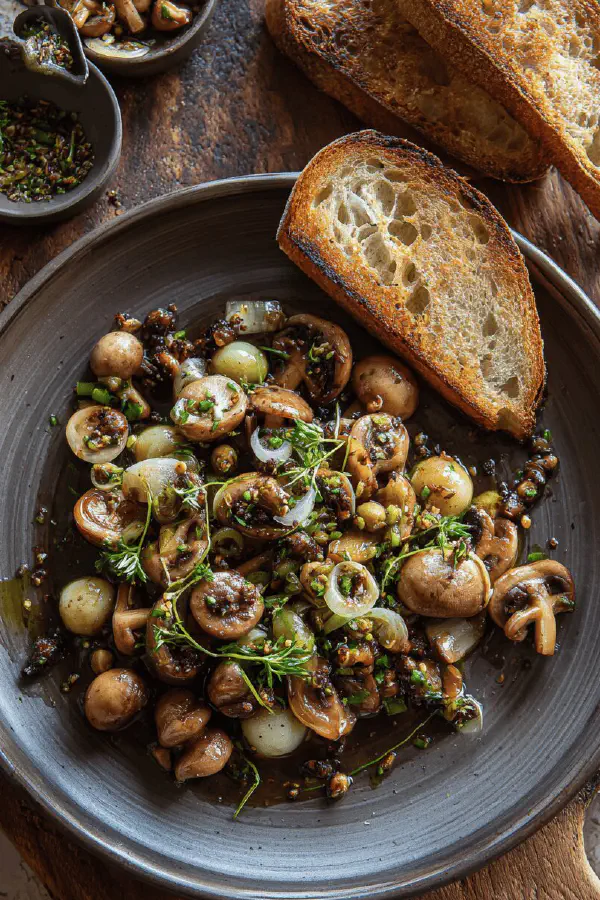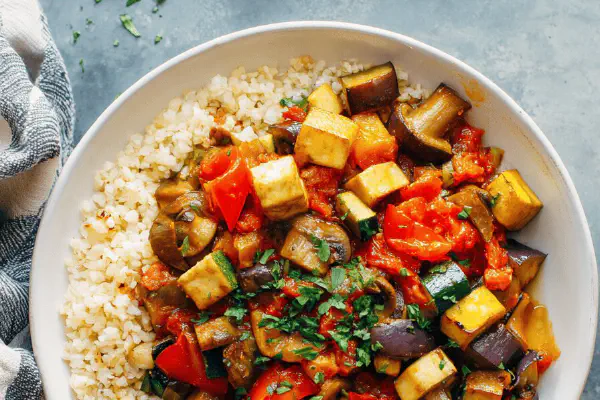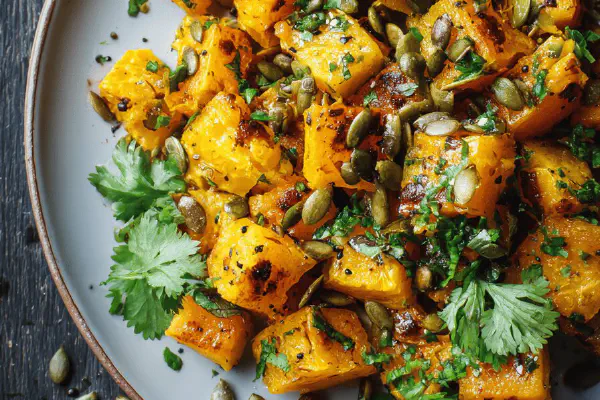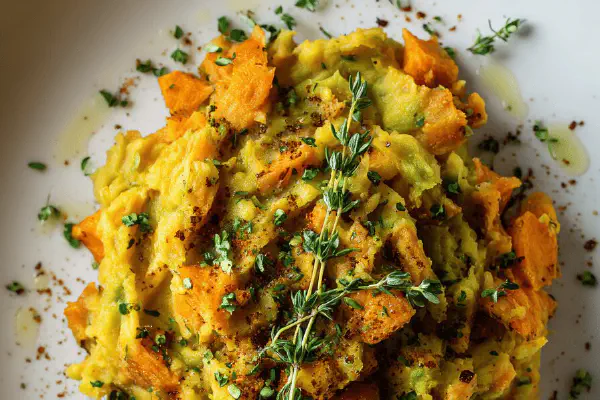Featured Recipe
Mushroom Onion Marinade

By Kate
"
Pearl onions and mixed mushrooms sautéed with mustard and fennel seeds, deglazed in sherry vinegar, tossed in walnut oil. Chilled 1.5 hours. Serve room temp alongside rustic bread or charcuterie. Earthy, tangy, herbal. Uses pleurotes and porcini mushrooms replaced by cremini and oyster varieties. Balanced acidity, subtle crunch from seeds. Classic French technique simplified for home cooks. Adaptable, vegan, gluten and nut free when swapped accordingly.
"
Prep:
20 min
Cook:
30 min
Total:
50 min
Serves:
4 servings
vegan
gluten-free
French cuisine
marinade
sides
Introduction
Pearl onions translucent. Tiny pops as oil heats. Mushrooms softening alongside, releasing earthy musk. Mustard and fennel seeds crackle, perfume filling kitchen. Vinegar sizzles as it hits hot pan, scraping brown bits—is bait for deeper taste. Cooling off under foil. Chilling flavors merge quietly in the cold. Textures firm yet yielding. Be patient; rush ruins layers. Simple ingredients but technique makes difference. Forget precise timing; see, smell, hear. Know softness, slight caramel, brightness from acidity balanced by rich oil. A vegan antipasto, a room-temp side or topping. Avoid mushy mushrooms, undercooked onions, or sharp vinegar that bites too hard. Respect the process, trust senses, adjust seasoning last minute. Keep pan moving. Don’t crowd with too many mushrooms. Save some oil for finish—adds silkiness. The result isn’t just a salad—it’s texture and depth layered by time and heat.
Ingredients
About the ingredients
Pearl onions can be swapped for small shallots if you find them more accessible—similarly sweet and tender when cooked slowly. Walnut oil offers a fragrant, nutty background note; substitute with good quality extra virgin olive oil if allergic or avoiding nuts, but expect less aroma. Used fennel seeds instead of coriander for a sweeter, more anise-like aroma that pairs beautifully with mushrooms and vinegar. Mustard seeds get toasted in dry pan first to unlock essential oils—don’t skip this step unless seeds are pre-toasted. Vinegar choice impacts flavor: sherry vinegar is mellow and nutty; apple cider vinegar more tart. Fresh thyme replaced rosemary for a subtler woodsy note that won’t overpower the delicate mushrooms. Season steadily—not too early or late; mushrooms absorb salt and release their own liquid.
Method
Technique Tips
Slow cooking onions at moderate heat extracts sugars, avoids bitterness and mush. Listen for gentle bubbling and watch as edges soften to amber. Mushrooms love high heat but don’t overcrowd pan—moisture needs room to evaporate or they steam dull, soggy. Constant stirring ensures even browning and prevents burning seeds. Deglazing traps flavor stuck to pan; important here to pull layers of taste and prevent burnt residues. Adding oil after vinegar preserves its fresh, unheated flavors and rounds acidity. Cooling down before refrigerating stops cooking abruptly, preserving texture. Let marinade rest so flavors marry; the acidic punch mellows and mushrooms soak up aromatics. Plan ahead—flavors need time to harmonize. When serving, let dish warm up slightly from fridge if too cold; flavors pop better at room temp. If oil solidifies, whisk in small splash warm water gently to loosen before serving.
Chef's Notes
- 💡 Cooking onions slowly at low heat is key. Listen for a soft bubble sound. Watch for a slight brown around edges. Too high heat; bitterness. Need tenderness, not mush.
- 💡 Toasting mustard and fennel seeds before adding enhances flavor. Skip this; miss out. Smell it; aroma pays off later. Keeps flavor bright and adds depth. Don't rush.
- 💡 Use your senses. Onions should be translucent, mushrooms golden with crispy edges—check both. Adjust heat if browning too fast or still raw—look and listen.
- 💡 Avoid overcrowding mushrooms. Give them room. Steam is the enemy. Can sauté in batches for even cooking. Constant stirring helps brown evenly and avoid burning.
- 💡 Finish with oil after deglazing. Walnut oil adds richness. If using olive oil remember aroma differs—impact on flavor. Let mixture cool before resting. Helps flavors mingle.
Kitchen Wisdom
Can I use different mushrooms?
Yes, variety helps. Substitute with shiitake or button mushrooms if needed. Textures vary but flavors still work. Go for what you have.
What's a good substitute for sherry vinegar?
Apple cider vinegar works but more tart. Use low acidity. Balsamic could be sweet, adjust balances. Taste before adding.
How do I store leftovers?
Keep in airtight container for a couple days. Cold storage is best. Let flavors mingle more. If too solid, thin with warm water.
How do I know if onions are ready?
Tender and slightly caramelized. Not mushy. Test by pressing; should yield. Watch color; golden light brown is ideal.



